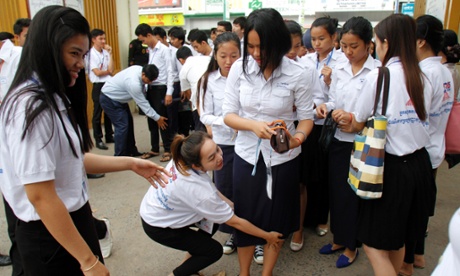Education ministry cleans up system in which students have routinely bribed teachers to help them pass tests for university

When Tep Seila’s older brother sat his all-important grade 12 exams, he was able to use “cheat sheets” to help him pass after paying the school heads a few dollars per subject.
But Seila, a 21-year-old from a poor family of rice farmers with an NGO scholarship to study in the Cambodian capital, Phnom Penh, could not do the same when he sat the tests last month.
“I think if I could have cheated I could have passed,” he said on Friday, minutes after learning that he had failed to obtain his high school diploma. “But this year was so strict and I couldn’t get the answer sheet.”
Seila is angry that he wasn’t allowed the cheating privileges long enjoyed by Cambodian students at these exams, a pass mark from which is required for university entrance. He’s not alone.
The results of a government blitz on cheating and corruption at this year’s grade 12 exams have just been revealed. Only 26% of students passed, compared with 87% last year, and only 11 students out of the almost 90,000 who sat the exams obtained the top A grade.
For the first time in recent history, all the students who passed did so purely on merit, according to the education ministry.
In past years, students were able to bring mobile phones and cheat sheets into the exam rooms. Teachers would leak test papers for a fee, students would pool money to get proctors to turn a blind eye to their cheating, and parents would even throw rocks wrapped with answer sheets through the windows of testing centres.
This year was different. Copies of the exam were kept under lock and key, military police were deployed at testing sites, students were patted down no fewer than three times as they entered exam halls, and crucially, thousands of volunteers were hired by the government anti-corruption unit as independent monitors.
“It was totally different compared to all the previous high school exams, particularly at grade 12,” says Preap Kol, executive director atTransparency International Cambodia.
Kol, whose organisation ranks Cambodia 160th out of 177 countries in itscorruption perceptions index, says corruption is “systematic” in the education system. This means that from an early age, students learn in an environment where paying bribes is not only normal, but expected.
“If you look at state primary schools, when students enter, they will experience being asked by the teacher to give some money, either in the form of buying lessons or as ‘thank you’ [payments],” Kol says. “Every month the teacher sends a grade book to parents and when you return to school teachers will expect some money in this.”
Many teachers also collect small amounts of money from pupils every day, and will often only partially teach the syllabus in order to hold extra classes for more fees.
A 2007 study by NGO Education Partnership (pdf) found that Cambodian parents were spending an average of $108 (£82) a year in informal fees to send one child to a state primary or secondary school, equal to 8.6% of average family income. But teachers, who are paid paltry salaries, say they have no choice.
Chhun Heng*, a 36-year-old philosophy teacher, has been teaching since 2003, earning $150 a month. Petrol and food alone cost him and his wife about $10 a day, he says. So like most teachers, Heng does other jobs to make ends meet.
“How can I live on $150 a month? If you divide my salary by 30? In the morning, I spend 10,000 riel ($2.50) on coffee and noodles alone. So how about parties? Or food? Or doctor’s visits? Or toothpaste? Or haircuts?”
Heng says he feels ashamed that he takes bribes from students, but gets defensive when the ethics of the practice are questioned. “They want to kill teachers for corruption but why don’t they target corruption in their own office first?” he says of high-ranking government officials.
While Cambodian education ministers have tried to clean up national exams before, only to see them soon become mired in corruption again, the recently appointed minister, Hang Chuon Naron, appears determined to make permanent changes.
“The result of the exam allows us to fix our education system, [because] we can see the strengths and the weaknesses [clearly],” he says. “[The reforms] are necessary because we cannot allow this to continue, otherwise we will produce massive [numbers] of graduates who will not be able to find jobs.”
But the three-quarters of students who failed this year have been given a second chance. The prime minister has announced a retest on 13 October. However, some students are pessimistic about their chances of passing under the same tough conditions, even with more time to prepare.
With tears rolling down her cheeks after realising she had failed, an 18-year-old who gave her name only as Chhorn bemoaned the changes. “I’m angry at the reforms. It was too fast and we could not focus on studying,” she said, sobbing.
“Last year, my sister could cheat. She passed and now she’s at university. But I don’t know if I can go to university in October. I don’t know if I can pass.”
*name has been changed

3 comments:
KiMedia is dead. only two people comment on this page. Kalonch chuck and Jendhamuny. What happened to KI-Media?
Khmer are stupid, low in I.Q. Even in the US, Khmer most likely could not finish school.
9:33am; lick my balls---I'm a college grad asshole.
Post a Comment